Anthropology
-
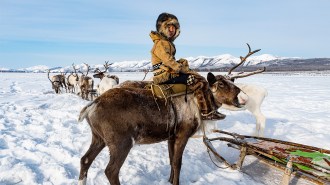 Psychology
PsychologyNavigation research often excludes the environment. That’s starting to change
Participants “navigating” on a lab computer have shaped navigation knowledge. Studies that add in the environment challenge those findings.
By Sujata Gupta -
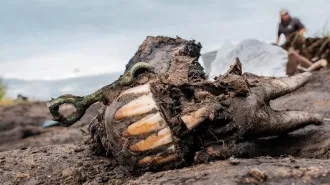 Archaeology
ArchaeologyAncient Scythians had cultural roots in Siberia
A possible sacrificial ritual from around 2,800 years ago suggests mounted herders from Siberia shaped a Eurasian culture thousands of kilometers away.
By Bruce Bower -
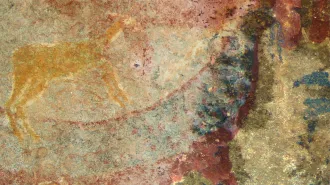 Anthropology
AnthropologyFossils of an extinct animal may have inspired this cave art drawing
Unusual tusks on preserved skulls of dicynodonts influenced the look of a mythical beast painted by Southern Africa’s San people, a researcher suspects.
By Bruce Bower -
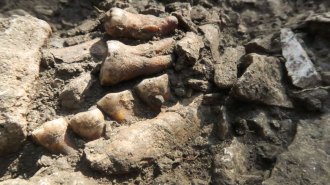 Anthropology
AnthropologyAncient DNA unveils a previously unknown line of Neandertals
DNA from a partial skeleton found in France indicates that European Neandertals consisted of at least two genetically distinct populations.
By Bruce Bower -
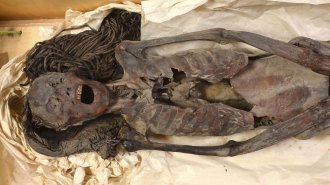 Anthropology
AnthropologyAn Egyptian mummy’s silent ‘scream’ might have been fixed at death
A rare muscle-stiffening reaction could explain the open-mouthed expression of a mummy known as the Screaming Woman, scientists suggest.
By Bruce Bower -
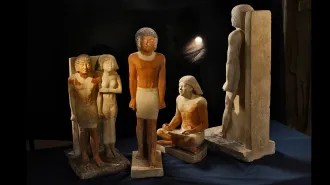 Archaeology
ArchaeologyAncient Egyptian scribes’ work left its mark on their skeletons
Years of hunching over, chewing pens and gripping brushes left the skeletons of Egyptian scribes with telltale marks of arthritis and other damage.
-
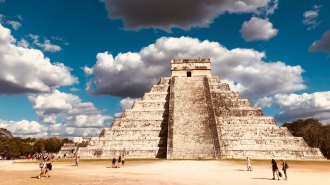 Anthropology
AnthropologyChild sacrifices at famed Maya site were all boys, many closely related
DNA analysis shows victims in one underground chamber at Chichén Itzá included twins, perhaps representing mythological figures.
By Bruce Bower -
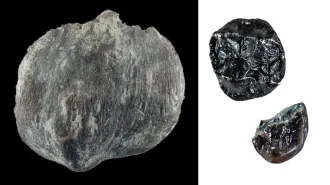 Anthropology
AnthropologyFossil finds amplify Europe’s status as a hotbed of great ape evolution
A kneecap and two teeth belonged to the smallest known great ape, a study contends. If so, it’s the first to coexist with another great ape in Europe.
By Bruce Bower -
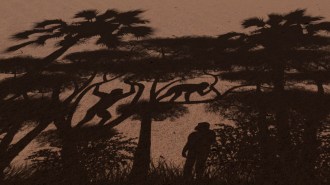 Anthropology
Anthropology50 years ago, evidence showed that an extinct human ancestor walked upright
Fossil finds have since pushed back the ability of hominids to walk on two legs by millions of years.
-
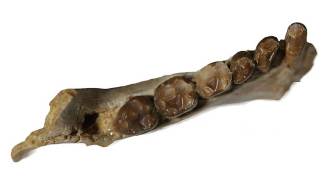 Anthropology
AnthropologyAncient primates’ unchipped teeth hint that they ate mostly fruit
Of more than 400 teeth collected, just 21 were chipped, suggesting that early primate diets were soft on their choppers.
-
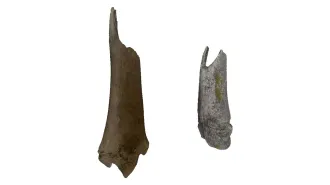 Anthropology
AnthropologySpanish horses joined Indigenous South Americans’ societies long before Europeans came to stay
By the early 1600s, hunter-gatherers at the continent’s southern tip adopted horses left behind by colonial newcomers, new finds suggest.
By Bruce Bower -
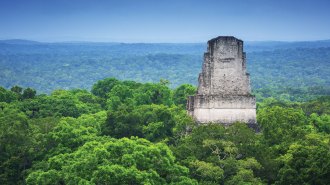 Archaeology
ArchaeologyAncient Maya power brokers lived in neighborhoods, not just palaces
Lidar discoveries and recent excavations are forcing archaeologists to rethink ancient Maya political structures.
By Bruce Bower